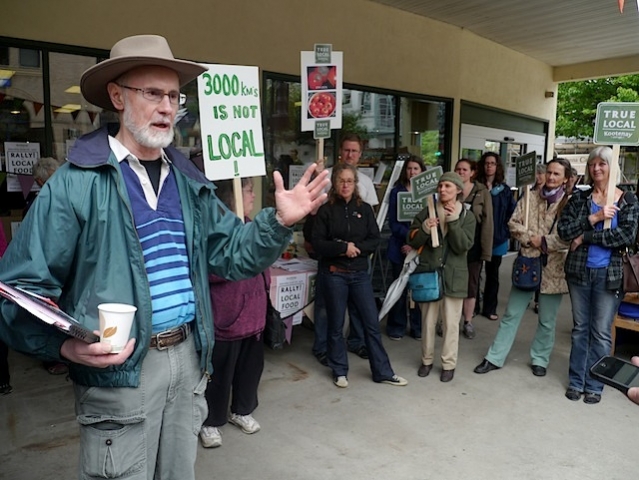Kootenay Co-op rallies against new federal definition of 'local' and launches 'True Local' program
The federal government is changing the definition of the word “local” as it applies to food labeling, and the Kootenay Coop says that will hurt many of the farmers that it buys from. The Co-op’s move to fight the change began with a rally in front of its Baker St. store on Saturday.
At the rally the Co-op unveiled a petition and kicked off a new local marketing strategy.
The Canadian Food Inspection Agency used to allow stores to designate food as local if it was produced within 50 kilometres. The new definition broadens “local” to mean food produced anywhere in the province and up to 50 kilometers across any border.
Consumers will be misled, Co-op says
The Co-op’s marketing manager Jocelyn Carver says that means farmers in the immediate area will now have to compete with farmers across the province to provide food to customers who make a point of buying local food. She said those consumers will be misled by the new “local” designation.
Change benefits the big companies
She said the move benefits big supermarkets and food producers. “Broadening the definition of local to make it basically B.C. grown or crossing national and international borders benefits people whose businesses are already at an economy of scale where they can successfully export to other markets but can now be said are providing a local market,” said Carver.
She said the Kootenay Co-op has worked hard to cultivate a local agricultural economy by supporting local farmers, and the change undermines the development of local food security both here and in rural areas across the country.
An alternative definition
Carver encouraged the people at the rally to sign a petition urging the federal government to get input from small to medium sized farms and food processing businesses before permanently changing the definition.
She also launched the True Local label, which will be attached to food sold at the Co-op that has been produced within the following boundaries:
- West to Grand Forks
- East to Creston/Canyon/Lister
- Northwest to Nakusp including the Arrow Lakes region
- Northeast including Kaslo, Meadow Creek, Trout Lake, Argenta, and Johnsons Landing
- South to the U.S. border
Government’s consultation process is backwards, says Atamanenko
Speaking at the rally, BC Southern Interior MP Alex Atamanenko criticized the CFIA for first changing the policy and then announcing that it will follow up with public consultations.
“Normally, when you have an existing policy you say, OK folks, we are thinking of changing the policy so lets do some consultations across the country, let’s talk to people like the Coop here, let’s talk to the National Farmers Union, the Federation of Agriculture, all those representing farmers, and once we have done that, then let’s lay out a policy.
“My question to the federal government is how valid are the consultations, or are they just going to be talking to their friends like the Western Canadian Wheat Growers and Monsanto and CropLife to rubber stamp what they are doing. That is a question but I think the answer is in the question.”
MLA Michelle Mungall and Colleen Ross, vice-president of the National Farmers Union, also spoke at the rally.

























